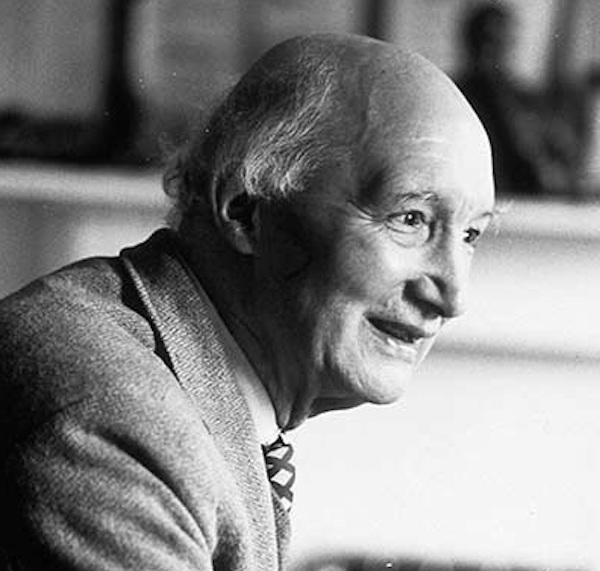As a law student Tom Kelly met Tom Denning ... Visiting lecture in Sydney ... Problem of the missing teeth ... No recollection of what was said ... Later realisation that the Master of the Rolls may not have been such a wonderful chap ... Confusion about the Dennings
 Denning: bad teeth, good suit
Denning: bad teeth, good suit
In 1967 I was a law undergraduate at the University of Sydney. One day on arrival our lecturer seemed excited. He announced that instead of the usual class we would be addressed by the greatest living judge in the English-speaking word, perhaps the greatest ever - Lord Denning, who rejoiced in the mysterious title of the Master of the Rolls.
His name was certainly familiar as his judgments were frequently quoted to us, often with passionate approval.
A smallish balding man, dressed in the best tailored suit I had seen, walked to the lectern. I have no recall of what he said but I remember the sound of his seductive oratory.
I especially remember his extraordinarily pronounced lisp, which excited our collective curiosity. On closer observation we saw that our dapper speaker was missing his top six front teeth. Some subdued muttering and merriment broke out among the students.
We never did find out if the missing teeth were the cause of the lisp - whether he spoke like that when his denture was in situ; whether he generally eschewed any use of a denture; whether he had some permanent or temporary health issue that made the use of a denture problematic; whether he had accidentally stood on his denture that morning; or whether he left the denture in a glass of water in a hotel room or his London home.
Years later I came to realise that our highly esteemed toothless jurist was just another reactionary racist.
In 1990, as a Euro sceptic, in 1990 he said: "... it was entirely wrong for this country to have put its interests in Europe into the hands of a German Jew, if you please called Leon Brittan", the Tory Home Secretary and QC. [1990 interview in The Spectator by A.N. Wilson, quoted in The Independent by A.N. Wilson, March 3, 1999.]
In 1982, he published an article suggesting some members of the black community were unsuitable to serve on juries, and that immigrant groups may have had different moral standards to native Englishmen. [Iris Freeman, Denning - A Life, 1993 at p.392.]
In 1980, while dismissing an appeal by the Birmingham Six, a group of Irishmen convicted of a London pub bombing, he judged that the men should be stopped from challenging legal decisions. He listed several reasons for not allowing their appeal.
"Just consider the course of events if their action were to proceed to trial ... If the six men failed it would mean that much time and money and worry would have been expended by many people to no good purpose. If they won, it would mean that the police were guilty of perjury; that they were guilty of violence and threats; that the confessions were involuntary and improperly admitted in evidence; and that the convictions were erroneous ... That was such an appalling vista that every sensible person would say, 'It cannot be right that these actions should go any further'." [Catherine Elliott, English Legal System, 2007 at p.157.]
Fortunately, 19 years later this obiter was ignored by an appeal court which freed the Six because of various gross miscarriages of justice that had resulted in their convictions.
In 1990 Lord Denning publicly discussed the convictions of the Guildford Four, another group of Irishmen who were convicted of blowing up a London pub. He was opposing the public support for a judicial enquiry into miscarriages of justice which resulted in life sentences.
These miscarriages became the subject of the well received film In The Name Of The Father. Denning remarked that if the Guildford Four had been hanged -
"They'd probably have hanged the right men. Just not proved against them, that's all. We shouldn't have all these campaigns to get the Birmingham Six released if they'd been hanged. They'd have been forgotten, and the whole community would be satisfied ... It is better that some innocent men remain in jail than that the integrity of the English judicial system be impugned." [Iris Freeman, Denning - A Life at p.412.]
Fortunately for the prisoners, this was not the view of the appeal court which released them in 1989.
In 1980 the name Denning was to again cause me some amusement. I was instructing the late barrister/playwright Merv Rutherford in a criminal trial at Darlinghurst.
This was the time that the notorious armed-robber Ray Denning had escaped from Grafton Gaol and was on the lam for a long time, during which he got himself publicity by giving interviews to journalists; arranging for post cards to be sent to police officers from various NSW tourist towns; and even tipped off a journalist that he had stuck a cheeky letter addressed to police to the front door of the CIB.
As Merv was cross-examining a police witness, the Crown Prosecutor objected to one of his questions. In detailing his reasons for objection he quoted "Denning".
With one eye on the jury, Merv rose to his feet saying: "Point of clarification, Your Honour. Is my learned friend quoting Lord or Ray?".
His Honour directed Merv to resume his seat.
Tom Kelly is a former Public Solicitor of New South Wales
I Once Met ... Bob Hawke
I Once Met ... Lionel Murphy
I Once Met ... Paul Keating
I Once Met ... Margaret Thatcher
I Once Met ... Arnold Schwarzenegger